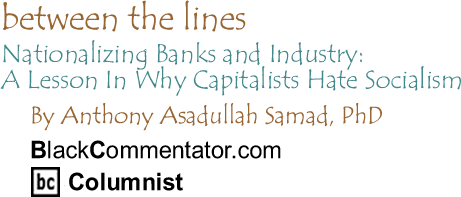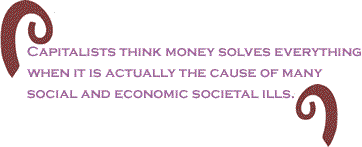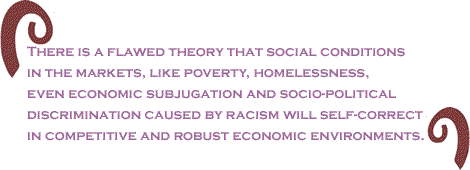
|
|||||||||||||||||||||||

|
|||

Custom Search
|
|||
 |
|||
The United States has always been a political economy, requiring government regulation of its finance and money markets, and using government stimulation of its labor force. “Free Market” enterprise is based on the notion that open markets and the competition derived from competing ideas for consumer patronage will create a market balance (equilibrium) that will produce a stable economy and wide prosperity. There is also a flawed theory that social conditions in the markets, like poverty, homelessness, even economic subjugation and socio-political discrimination caused by racism will self-correct in competitive and robust economic environments. Capitalists think money solves everything when it is actually the cause of many social and economic societal ills. Particularly as it relates to the distribution and redistribution of income and wealth. Capitalism is based on maximizing wealth without limit, and has few safeguards as it relates to greed and class conflict (deflation of egalitarianism). It’s hard to be a “society of equals” when one smaller segment has all the wealth and the larger segment has no wealth at all. America does a very poor job of wealth distribution. It is limited to those who have, and those who don’t need to pull themselves up by their “own bootstraps,” even if they don’t have shoestrings. Yet, when major industry and major markets get in trouble, they look to the government for stabilization. Without conditions, and therein lies the problem. Capitalist don’t like to be socialized (conditioned to share in a responsible way). When President Obama was campaigning to become President, he suggested that government look after “Main Street” instead of “Wall Street” to help redistribute the wealth (and the pain). Quickly, capitalists called him a “redistributor.” That was a nice way of calling him a “socialist.” When the President conditioned the auto industry bailout, after the gross abuses of bonuses and posh retreats by the banks and securities companies that received economic stimulus dollars, the critics said he was trying to “nationalize” the economy. Another way of saying he’s introducing socialism. Most of us wasn’t alive during the Depression, but this period in our lives has proven to be a great lesson in why capitalists hate socialists. Wealth redistribution is not their favorite topic. The ideological divide in the two party political system separates the “wasteful spenders” from “responsible government.” The former seeks to maintain a stable society by creating a social safety through income redistribution. The latter seeks to keep government out of the affairs of social problems and marginalizes wealth redistribution. One promotes social responsibility, while the other promotes individual responsibility. One would prefer to tax and pay as they spend (as we should), while the other prefers not to tax, keep the wealth, spend anyway and let future generations pay it back. The irony here is that one is labeled as wasteful for engaging in social spending, while the other is not labeled as spenders while clearly being wasteful. But what does that mean in the context of a failed economy? One invests in the labor force (retraining of people), while the other invests in stabilizing the markets (recapitalizing industry). Both have helped jumpstart the economy in the past. Both strategies assume everybody will act in a responsible way. Neither strategy accounts for greed.
So, when the U.S. government invested in keeping Wall Street solvent, the industry acted as capitalist do, use the money as a wealth buffer, not a market stimulus. Bankers and money changers sought to “get theirs” and rest of America, “be damned.” Meanwhile, the notion that the government is supposed to have a social safety net for health care and for elders care is suddenly a foreign proposition. But it is a strategy that worked for the nation when the markets collapsed in 1929. The government took care of those who couldn’t take care of themselves. Economist John Maynard Keynes, President Franklin Roosevelt’s economic advisor, designed a strategy to use government infrastructure development (building roads, highways, bridges and government building) to put America back to work. Now, it’s being called “nationalism” and “socialism” to suggest the government put people back to work.
We cannot continue to let capitalists do what they do, shun market equilibrium caused by socio-economic disparities. Nor can we continue to throw money at failed industry. Mandates on responsible economic behavior is not nationalism. Investing in retraining the American people is not socialism. What capitalists are finding out is they can’t buy (or spend) their way out of everything. They can redistribute money to the corporations all they want, but if the people have no money to spend, the economy will continue to crash. Social spending will bring the markets into balance, distribute money to the masses and maintain the safety net, while opening the money floodgates back into the economy. It’s not the only way, but it’s the only way we trust. It’s one way that will be difficult for capitalists to violate us. Call it whatever you want, but call it fair. A tough lesson for capitalists, but one they need to learn from. BlackCommentator.com Columnist, Dr. Anthony Asadullah Samad, is a national columnist, managing director of the Urban Issues Forum and author of Saving The Race: Empowerment Through Wisdom. His Website is AnthonySamad.com. Click here to contact Dr. Samad. |
|||
Any BlackCommentator.com article may be re-printed so long as it is re-printed in its entirety and full credit given to the author and www.BlackCommentator.com. If the re-print is on the Internet we additionally request a link back to the original piece on our Website. Your comments are always welcome. eMail re-print notice
If you send us an eMail message we may publish all or part of it, unless you tell us it is not for publication. You may also request that we withhold your name. Thank you very much for your readership. |
|||
| |
|||
| April
9 , 2009 Issue 319 |
|
| Executive Editor: Bill Fletcher, Jr. |
| Managing Editor: Nancy Littlefield |
| Publisher: Peter Gamble |
| Est. April 5, 2002 |
Printer Friendly Version
in resizeable plain
text format or pdf
format. |
| Frequently Asked Questions |
 |

|
 |
 |
 |
| |
| |




































